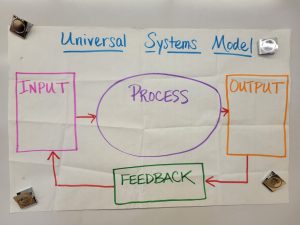Healthy Systems Mean Choosing Healthy Inputs!
Hello Everyone!
As part of this unit, we have been unpacking the deeper concept of SYSTEMS. To do this, we are using the Universal Systems Model.
We identified what each part of the model means, and we looked at a variety of systems, such as our solar system, the government system, and the food delivery system (like a grocery store).
It has also been helpful when looking at the system involved in creating a classroom community, such as Division 5. If the OUTPUT we want is a healthy classroom community, friendships, and positive feelings every day, then what kinds of INPUTS do we all need to commit to providing to our community? What do we need? Some things we have been highlighting as important as INPUTS are:
- Having awareness about personal space
- Communicating our needs, and doing it in kind, mature ways
- Following the expected behaviours
- Working with the GROUP PLAN rather than just our SOLO (me, me, me) PLAN
- Contributing to discussion, projects, and classroom clean up
- Being aware of school rules for safety of everyone
- Using the H.E.A.R. strategy to truly listen with our bodies and minds
- Taking turns to talk and not being an “interrupting chicken”
- Using our words rather than yelling or using physical ways to communicate
Of course, our main focus this unit is learning about human body systems. What personal choices do we make every day that impact and are INPUTS to the SYSTEM of the human body? How will we know if we have made the correct personal choices? Which choices do we have control over, and which ones do we not have control over? How do we give FEEDBACK to others when we aren’t getting what we need? How does the body give us FEEDBACK to let us know we need to change our INPUTS?
We are emphasizing these healthy INPUTS as we go along:
- Managing ourselves – our time, our supplies, our space
- Cultivating healthy relationships with classmates
- Choosing healthy foods
- Getting enough sleep (students this age need 10-12 hours a night)
- Having balance between our activities, academics, and down time such as play
- Paying attention to appropriate hygiene
- Wearing the correct clothing to protect ourselves from the elements
- Finding ways to calm ourselves and understanding how this helps (arts, mindfulness techniques, play time, fresh air, being outside)
- Getting exercise in a variety of ways (dance, running, yoga)
- Making goals and taking time to reflect on them
I look forward to talking with Division 5 more about this in the coming weeks!
Ms. D

